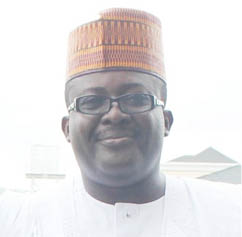Joseph Enegela is a medical doctor and Chief Executive Officer (CEO) of the Africa Disease Prevention and Research Development Initiative (ADRAP). In this interview, Enegela, who has experience in HIV/AIDS programmes, tuberculosis (TB) and other public health interventions, speaks on ways to strengthen the Nigeria’s health workforce, address gaps in disease preparedness and response in Africa, the Africa Disease Reporting Fellowship (ADReF) for journalists, among others.
What is your assessment of the number of healthcare workers in Nigeria, and how do you think the country can expand its healthcare workforce?
We don’t have enough healthcare workers, and the ones we have are not even staying. So, first of all, the country needs to invest in more training institutions; not just only for doctors, but also for other cadres of healthcare workers: nurses and community healthcare workers.
Secondly, the country has to invest in special remuneration for healthcare workers. So, the japa syndrome has nothing to do with anything else, but finance.
What do you think are the missing gaps in disease preparedness and response in Africa?
The major thing is that our healthcare systems need to be strengthened. We need health systems strengthening in all aspects starting from disease reportage.
So, our surveillance system first of all needs to be on point so that when something happens somewhere, we report it quickly, and our response can be faster.
Our reporting systems are poor and therefore somebody may have Lassa fever in my village and before you find out or before it is reported to the Nigerian Centre for Disease Control and Prevention (NCDC) it has spread to sevéral people. So, our surveillance system needs to be strong.
It is also important for us to understand the simple principle of disease response; that is the one that we have always been singing, “In time of peace, prepare for war”. So, in time of peace before the outbreaks start, what do you do? If you know that what you need is ABCD for response to yellow fever outbreak, have some in your store waiting. You don’t wait until when it breaks out before you start procuring. If you know that there is a seasonal occurrence of outbreak of Lassa fever, and it happens between October and March of the following year, what do you do in that period? You make sure that you do simulation exercises, you ensure that you build the capacity of healthcare workers.
The preparedness is what we require. We are not there yet, so we must make that clock work.
I am happy that NCDC has been very good in doing that over the past few years, because they have technical working groups for all the regular diseases.
Tell us about ADRAP?
ADRAP was 10 years old as of December last year. We have been involved since then, majorly in these areas: capacity building for healthcare workers (physical and online), cross border disease surveillance and direct disease intervention.
We have also been involved in health systems strengthening across the West African sub region.
How many health workers have you trained so far?
I used to work for US government-funded projects like the AIDS Relief Grant. I went to work for the Center for Clinical Care and Clinical research
before I moved back to ADRAP; and in all of that my experiences have been capacity building. I realised that we were going to have major issues in training.
First of all, the “japa” syndrome is not news; it has been going on. In fact, there is internal japa – NGOs employing staff from facilities, big facilities employing staff from small facilities. So, I realised that over time, you probably have only one doctor in a facility and you want to pull him out to run the
Prevention of Mother to Child Transmissions (PMTCT), TB training and other trainings, what time will he have to see the patients.
So, right from that time, I realised that we needed an alternative to the physical training that we did to be able to, not replace, but provide the kind of stop-gap capacity that we need for building our healthcare systems.
That’s how we started our virtual training. Since we started in 2009 on the online training aspect, we have trained well over 15,000 healthcare workers.
ADRAP organised the recently concluded inaugural edition of ADReF for journalists reporting health in Africa. What inspired you into organising the fellowship?
I am an African advocate, and for me it is Africa first. The truth is that I had always felt our stories were never told right by other people.
It is you in your house that know what is worrying you and tell somebody outside. The Western world has been the one reporting all our issues, disease outbreaks. A very clear example is the COVID-19 outbreak.
I felt people told stories. Who are the storytellers? The journalists, right? So, I felt the storytellers should be better trained to tell our stories in the best ways possible. That was the inspiration.
I also felt doing the physical training in Nigeria was good. Nigeria is big. We had 14 journalists selected from across six African countries, even though only 13 made it. We had over a 100 applications from journalists across Africa for the fellowship out of which 14 were selected.
The fellowship involved five weeks of active virtual mentorship engagements with highly experienced faculties and learnings from seasoned experts in science and health journalism, health promotion and administration, and other professionals in related fields.
We also just completed the final one-week (sixth week) face-to-face engagements with experts, partners and field trips in Abuja, Nigeria’s capital.
So, the ADReF fellowship has exceeded my expectations. The participation of the fellows was wonderful. And in fact, they inspired me. This wouldn’t stop because it has become a legacy project for me. So, watch out for ADReF 2025.




